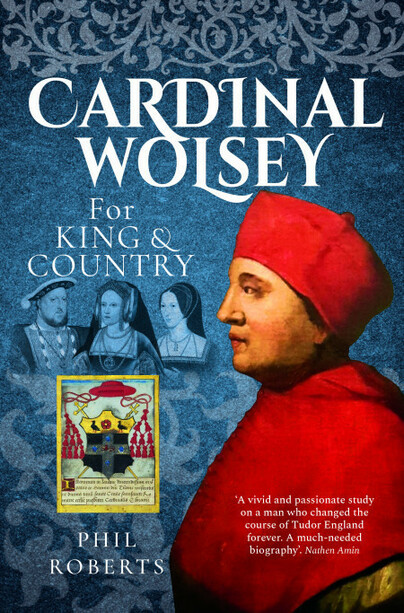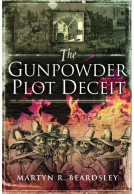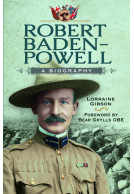Cardinal Wolsey (Paperback)
For King and Country
Imprint: Pen & Sword History
Pages: 216
Illustrations: 20 mono
ISBN: 9781399089067
Published: 28th February 2026
(click here for international delivery rates)
Order within the next 10 hours, 23 minutes to get your order processed the next working day!
Need a currency converter? Check XE.com for live rates
| Other formats available | Price |
|---|---|
| Cardinal Wolsey Hardback Add to Basket | £20.00 |
| Cardinal Wolsey ePub (27.6 MB) Add to Basket | £6.99 |
The Wolseys of Suffolk date to Anglo-Saxon times. The earliest notice of a Wolsey as inhabitant of Ipswich is Thomas Wolsey’s father, Robert. He was a successful small businessman and married a Joan Daundy. Thomas was probably born in 1471 in an inn, and was almost certainly baptised in St Mary at the Elms church, Ipswich.
Wolsey graduated from university and then his climb to power was extremely fast. He entered the royal household as the chaplain to King Henry VII. When Henry VIII ascended to the throne, Wolsey became his almoner, which gave him access to the king’s council. Henry was very impressed with Wolsey’s work, and Thomas gained many important clerical positions. In 1515, Wolsey became Lord Chancellor of England. Thomas Wolsey’s most famous peace treaty was signed between Henry VIII and Francis I of France at the glorious Field of Cloth of Gold in 1520.
Henry had not produced a male heir. A woman called Anne Boleyn came on the scene. Henry began to think that she could mother him a son. The king asked Wolsey to seek a divorce from his first wife. He tried his outmost, as always, but the Pope kept delaying the matter. Wolsey failed and fell out of favour with Henry. He was charged with treason and escorted to the Tower of London. On his way, Thomas became very frail and sadly, on 29 November 1530 he died at Leicester Abbey.
Rating: 5 out of 5 stars
NetGalley, Caroline Palmer
I have read a lot of books about the Tudor era, but it is great to find a biography about one of the most central figures in the Tudor story everyone over looks.
The book was very well written and nicely balanced, if you're a fan of the Tudor period, I would think you would enjoy this a lot.
The History Fella
Read the Full Review Here
Rating: 5 out of 5 stars
NetGalley, Heather Michael
Very interesting read! I absolutely love the Tudor period and I found this book fascinating. Highly recommend for all Tudor fans out there!
Very interesting! Not only does it provide the history of the man, but also the history of the surrounding times and people. It gave a much needed new perspective of the "why things happened" and "why they didn't".
NetGalley, Donna Pingry
This is a book for someone who knows the general facts about the Cardinal but wants to learn more about this man. If this sounds like you, I recommend you read “Cardinal Wolsey: For King and Country” by Phil Roberts.
NetGalley, Heidi Malagisi
Cardinal Wolsey is supposed to have remarked that if he had served God as diligently as he had done the king, he would not have given him over in his grey hairs. Indeed, he did serve King Henry VIII diligently, rising to the top as Lord Chancellor, and undertaking an enormous amount of work for him. Henry and the Cardinal were a good match in personalities, and they arguably understood each other. Wolsey tried to do what Henry wanted, and mostly did, even in the case of The Great Matter, but eventually he fell from grace for failing to achieve Henry's aim of marrying Anne Boleyn legally. He organised the Cloth of Gold, intending to make peace in Europe, and he advised Henry on politics, and was a prime mover in making treaties.
NetGalley, Lisa Sanderson
But Cardinal Wolsey shouldn't just be remembered for this, although he was England's 'greatest church statesman', according to the author. His greatest legacy is Christ Church college at Oxford, and he arguably founded the Ipswich Grammar School. He was also a great patron of the arts and architecture, leaving us the magnificent Hampton Court.
Phil Roberts certainly gets rid of many myths about the Cardinal (although unfortunately I can't help seeing Sam Neil's fantastic portrayal of the Cardinal in my mind) and restores his reputation. Some of my ancestors also came from Suffolk, so I like the fact that the great man came from that county.
It was an interesting and enjoyable book, although extremely detailed in parts.
The Tudor era in English history is one that has spawned thousands of books over the years. A large majority focus on Henry VIII and his six wives, as well as on his second daughter Elizabeth I. But there are others that focus on Thomas Cromwell, and in the case of Phil Roberts, on Cardinal Thomas Wolsey.
NetGalley, Mariama Thorlu-Bangura
Wolsey is often remembered as the man who failed to get a divorce for Henry VIII. But this book makes it clear that he cannot be defined by that one issue. Roberts presents a man who used his intellect to propel himself forward, catching the eye of the right people to aid his ascent. As Lord Chancellor ( what we would now call the prime minister), Wolsey more than adequately served Henry VIII. He handled foreign policy, domestic policy, and always knew how best to display the majesty of king and country. This is evidenced by the high point of his career: the Field of the Cloth of Gold. (A whole chapter is devoted to this event.) Roberts' goal was to present a more balanced view of Wolsey, and in this, I believe he was successful. I came away from this with a better understanding of Wolsey the man... this book is a worthy addition to the vast ouvre of Tudor era books.
About Phil Roberts
Philip Roberts is a Tudor historian and has worked for the Mary Rose Trust for twenty years. He is a lecturer and has appeared frequently on BBC Radio talking about the Tudor Age and the British Royal Family. He is the Sacristan at St. Mary at the Elms Church in Ipswich and has gained a first class degree. He lives in Suffolk.















